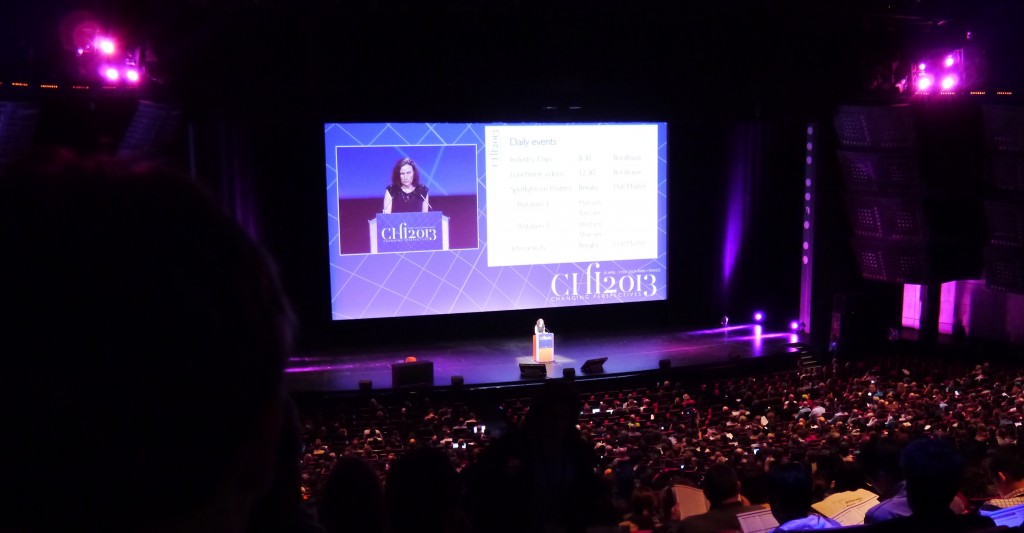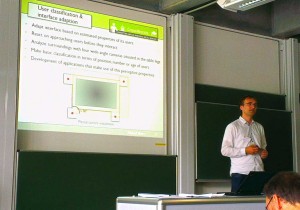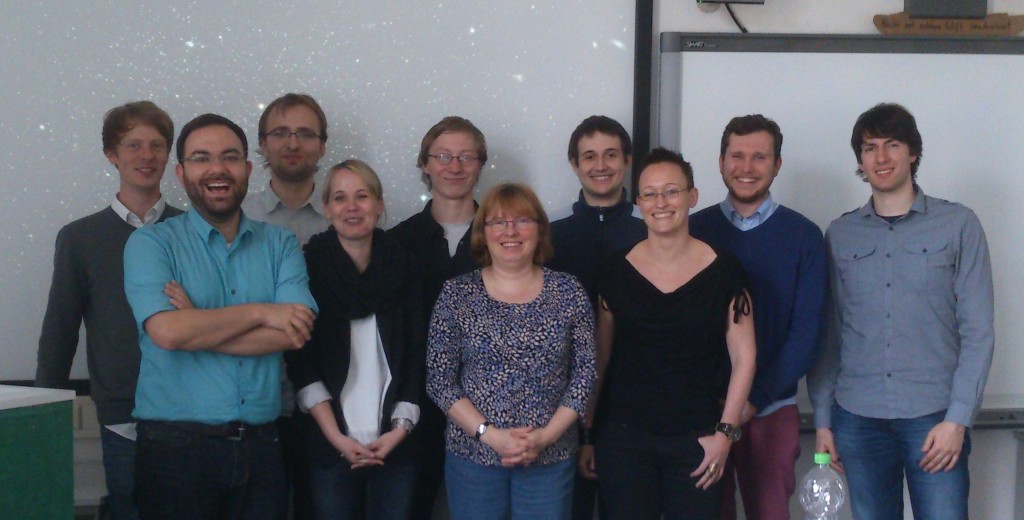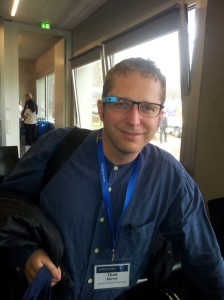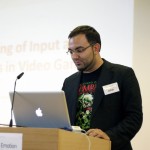
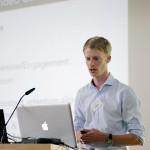 Last week, Benny Liebold and Daniel Pietschmann gave invited talks at the Games, Cognition, and Emotion Conference 2013 in Hamburg. Their contributions on States of Mind Are Not Merely Cognitive Phenomena: The Link Between Emotion and Focused Attention Allocation During Gameplay and Spatial Mapping of Input and Output Spaces in Video Games both concentrated on theoretical questions and foundations of their work at Crossworlds. Both talks were followed by positive and insightful discussions with conference participants from different research backgrounds. We thank the organizers, especially Felix Schröter from the Research Center for Media & Communication, for making us part of a great conference.
Last week, Benny Liebold and Daniel Pietschmann gave invited talks at the Games, Cognition, and Emotion Conference 2013 in Hamburg. Their contributions on States of Mind Are Not Merely Cognitive Phenomena: The Link Between Emotion and Focused Attention Allocation During Gameplay and Spatial Mapping of Input and Output Spaces in Video Games both concentrated on theoretical questions and foundations of their work at Crossworlds. Both talks were followed by positive and insightful discussions with conference participants from different research backgrounds. We thank the organizers, especially Felix Schröter from the Research Center for Media & Communication, for making us part of a great conference.
On June 6th, Professor Greg Welch, Ph.D. was giving a guest lecture on “Physical-Virtual Humans for Training and Teleportation”.
Greg Welch is a Research Professor in the Institute for Simulation & Training and the Computer Science division of EECS at The University of Central Florida. In 1986 he received a degree in Electrical Technology from Purdue University (with Highest Distinction), and in 1996 a Ph.D. in Computer Science from the University of North Carolina at Chapel Hill. Prior to coming to UCF, Welch was a Research Professor at UNC, he worked on the Voyager Spacecraft Project at NASA’s Jet Propulsion Laboratory, and on airborne electronic countermeasures at Northrop-Grumman’s Defense Systems Division.
His current research interests include virtual and augmented reality, human tracking systems, 3D telepresence, computer vision, and stochastic estimation. He has co-authored over 60 publications in these areas, and is a co-inventor on multiple patents. He has co-chaired conferences, workshops, and seminars; served on numerous international program committees; and is an Associate Editor for the journal Presence: Teleoperators and Virtual Environments. He maintains an internationally-recognized web site dedicated to the Kalman filter. He is a member of the IEEE Computer Society, the Association for Computing Machinery, and the Society for Simulation in Healthcare.
crossWorlds fellows Kalja Kanellopoulos and Michael Heidt were invited to present their paper ‘Stubborn Materialities / Unruly Aesthetics’ at CHI ’13. The participation in the workshop ‘Crafting Interactive Systems’ included a talk as well as acting as panellists for the session ‘technology as critique’. Focussing on a reconceptualization of the relationship between artistic and scientific practices, both researchers explored the potentials inherent in digital materialities. According to their positions, displacements introduced by interactive art open new expressive possibilities for aesthetic unmasking of power relations. The presentation sparked lively discussions as well as obtaining strongly positive feedback.
Throughout the conference, the field of HCI articulated itself as driven by a highly dynamic community. An atmosphere of openness towards heterodox thought was perceived as helpful intellectual catalyst, creating exciting opportunities for integration of scientific, artistic and designerly practices.
ACM CHI is widely acknowledged as the most prestigious conference in the field of Human-Computer-Interaction. This year’s CHI was the largest and most multicultural event hosted so far with around 3300 attendees, representing a total of 54 nations.
From Mai 26th to Mai 29th 2013 the DFG Research Training Groups in Computer Science met in Dagstuhl Castle. About 70 Professors and PhD-Students of 15 RTGs participated. This annual meeting takes place in Dagstuhl since 2007. The general idea of the meeting is to support networking between the young researchers. The RTGs presented their work and discussed their experiences. Maximilian Eibl gave an overview on CrossWorlds and Michael Storz presented his work. Keynotes were given by Frank Kirchner from the DFKI Bremen on “Robotics and Artificial Intelligence” and Bernt Schiele, director of the MPI Informatics Saarbrücken on “Scene Understanding – It’s Time to Address it Again”. An overview of the event can be found here.
Friday the 3th of May we had the pleasure to welcome Prof. Kerstin Dautenhan in Chemnitz for a talk on Challenges in human Robot Interaction. Kerstin Dautenhahn is Professor of Artificial Intelligence in the School of Computer Science, Faculty of Science, Technology and Creative Arts at University of Hertfordshire. There she is coordinator of the Adaptive Systems Research Group with the main areas of research in Human-Robot Interaction, Social Robotics, Socially Intelligent Agents and Artificial Life. In her talk on challenges in Human-Robot Interaction she gave plenty examples of robots and scenarios the Adaptive Systems Research Group created.
Kerstin Dautenhahn is former member of the Department of Biological Cybernetics at University of Bielefeld, Germany, 1990-1993, and AI-Lab at GMD (now Fraunhofer), Sankt Augustin, Germany, 1993-1996, and VUB Artificial Intelligence Laboratory, Brussels, Belgium. In April 2000 she joined the Department of Computer Science (now School of Computer Science) at University of Hertfordshire as Principal Lecturer. She got promoted to full Professor in 2003. We are very happy that she joined her rich experiences in interdisciplinary research – she joined Robotics as a studied Biologist – afterwards with some of our PhDs.
Further information about Kerstin Dautenhahn can be found on her Website.
Designing interactive systems requires knowledge about actual interaction processes that evolve during HCI. Acquiring this knowledge, however, is a matter of an adequate methodological approach that enables researchers to answer specific questions in the respective contexts that frame the interaction between the user and interactive systems.
With the aim to discuss the adequacy of different methodological strategies for specific applications, CrossWorlds is going to organize a workshop at Mensch & Computer 2013 (M&C) about “Methodological Approaches to HCI”. The workshop will serve as a platform for focused discussions about current interdisciplinary research projects that aim to design or evaluate various interactive systems (computers, robots, virtual agents). We therefore encourage graduate and postgraduate students to submit an extended abstract concerning their current methodological issues in HCI research.
More Information on the schedule and submission deadline will follow in due time.
Our fellow researcher Kalja Kanellopoulos was invited to take part in an interdisciplinary PhD workshop with Prof. Lucy Suchman at the Ruhr University Bochum last week. Suchman is an expert in anthropology and sociology, focusing on science and technology studies, feminist technoscience and human-computer interaction – to name only some of her main research areas. Before coming to the Lancaster University Department of Sociology and Centre for Science Studies she spent twenty years as a researcher at Xerox’s Palo Alto Research Center. Her book Human-Machine Reconfigurations. Plans and situated actions (embedded at the end of the article), first published in 1987 as her thesis, broadly influenced different scientific fields and still counts as one of the key texts in science and technology studies and human-computer interaction. The 12 participants of the workshop were invited to discuss their projects with Suchman, applying the concepts she developed to their own work. The inspiring one day workshop brought together young academics from different scientific fields, such as sociology, anthropology and media studies. It was organized by the Mercator Research Group.
Crossworlds participated at the expert discussions on Serious Gaming at the GameDays 2013 at TU Darmstadt last week. The goal of the talks was a get together and a consolidation of different game research groups within the German Society of Computer Science and the creation of a possible new interdisciplinary group concerning Serious Games research. Thanks to Stefan Göbel for inviting us!
Last week’s 13th International Symposium for Information Science was a very interesting experience for our collegiate Andreas Bischof and CrossWorld’s associated member Vera Obländer. Information Science is an interdisciplinary research field on the triad between knowledge, humans and information technology, as the German information science pioneer Gernot Wersig pointed out in 1993. Researchers from a broad vary of disciplines like library science, book science, applied informatics, hci design, interaction design, psychology or philosophy attended the conference at the Univesity of Apllied Science in Potsdam.
Among the key notes, talks and doctoral sessions several media informatics associates of Chemnitz University of Technology presented their work. Thomas Wilhelm gave insights on his concept for a web service to improve information retrieval technology. His colleague Marc Ritter presented a technical solution to improve digitization and extraction of metadata in video archives.
Andreas Bischof and Vera Obländer presented the first results from CrossWorld’s mutual research seminar, including all current members, associate researchers and students of Technische Universität Chemnitz. During the last semester we worked on an interdisciplinary, overarching taxonomy on interaction in human machine constellations. To combine and compare the different approaches to the term “interaction”, we developed a meta-definition with three structural features of definitions of interaction.
The paper (in German) and the whole conference proceedings can be found on the publication server of FH Potsdam.
The collegiate Vincent attended the 4th Augmented Human 2013, which took place in Stuttgart, Germany, on March 7 and 8. The conference focused on augmenting human capabilities through technology, seeking to improve human life. The keynote was held by Thad Starner, pioneer in wearable computing and Technical Lead/Manager on Google’s Project Glass. He talked about his work leading to Google Glass and some other hardware they invented, like a glove that can help people learning to play piano without having to pay attention. It was also interesting to hear how he started decades ago when wearable computers were only bulky prototypes, which he wore on a daily basis in his personal life.
All the presented papers detailed interesting concepts, like a camera in a football that generates a bird’s eye view when thrown, manipulation of emotional response by slightly changing the user’s reflection in a mirror or a system for gait rehabilitation for Parkinson’s patients. The whole conference was very inspiring and everyone agreed they were glad that they attended. The 5th Conference 2014 will be held in Kobe, Japan and our Collegiate hopes to attend again next year.
